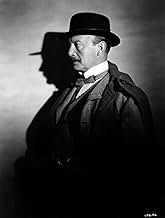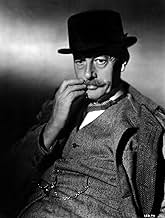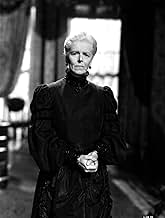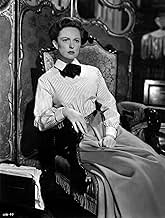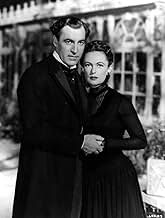After a sickly Victorian woman dies suddenly, a postmortem reveals that her body contains a fatal dose of arsenic. Suspicion falls on her husband and her companion, who are lovers. Inspector... Read allAfter a sickly Victorian woman dies suddenly, a postmortem reveals that her body contains a fatal dose of arsenic. Suspicion falls on her husband and her companion, who are lovers. Inspector Martin of Scotland Yard solves the mystery of her death, over a cup of tea.After a sickly Victorian woman dies suddenly, a postmortem reveals that her body contains a fatal dose of arsenic. Suspicion falls on her husband and her companion, who are lovers. Inspector Martin of Scotland Yard solves the mystery of her death, over a cup of tea.
Irene Arnaud
- Horace's wife
- (uncredited)
Frederick Kelsey
- Mr. Chudleigh
- (uncredited)
Ernest Metcalfe
- Cabbie
- (uncredited)
Sidney Monckton
- Horace
- (uncredited)
Featured reviews
The woman is dead but more alive than anyone else in the film, while they are all kept busy by her paranormal terror, using her life-long housemaid for an instrument. Jean Cadell is the housemaid and splendid as a formidable dinosaur. David Farrar is the husband and widower of the deceased and a victim of her terror for being just a poor school-teacher, while she was rich enough to own him. Geraldine Fitzgerald is the other victim as the secretary at the mercy of her whims of cruelty against her for being in love with her husband. So all have motives for disposing of the bed-ridden hag except Jean Cadell, who keeps her haunting and alive in the house after her death. Roland Culver is a very prudent police inspector who has to investigate a possible crime and who enjoys a cup of tea any time all around the clock. It's a great chamber play of tremendous passions with many outbursts of exploding tempers. Besides the tight and intensive dialog and the acute drama, it's a very beautiful film in a perfectly romantic environment in a great villa with a park and garden and a greenhouse and ideal music by Allan Gray. Everything combines to form a perfect domestic thriller of critical relationships driven to the brink of self-destruction, and nothing is missing to make it perfect. The only objection would be that it is too short - "the shortest full-length film I ever watched" as one reviewer aptly summed up his experience.
Suspicion falls on widower David Farrar and his pert young mistress (Geraldine Fitzgerald) when his sickly, shrewish wife dies of arsenic poisoning. Veteran director Maurice Elvey creates a nicely ominous atmosphere as the ghostly influence of the dead woman seems to pit the lovers against one another, but the middle act, in which Farrar and Fitzgerald grow increasingly suspicious of the other's possible motive for murder, tends to drag. Roland Culver as a dogged, no-nonsense Scotland Yard detective livens things up considerably.
"The Late Edwina Black" from 1951 stars Geraldine Fitzgerald, a favorite of mine, and David Farrar.
The story takes place in Victorian England. Gregory, Edwina Black's husband, is a schoolteacher. Edwina herself seems to be an invalid and independently wealthy. Her companion from childhood is Ellen (Jean Cadell).
The other person helping with Mrs. Black is Elizabeth. Elizabeth happens to be in love with Gregory, and he with her, and Ellen knows it.
One day Mrs. Black is found dead, and while at first it seems like a heart attack, it appears she was poisoned. A police inspector (Roland Culver) comes around as soon as it is learned how Mrs. Black died. His questions annoy Gregory and upset Edwina.
Before you know it, the two of them are suspecting one another. Elizabeth believes Edwina's spirit is still present and trying to destroy both of them.
Good movie, good mystery, with fine acting. It really does keep you wondering. The atmosphere is terrific, mostly inside a big, dark, gloomy house, which is perfect for the plot.
David Farrar was quite handsome but, like Dirk Bogarde before him, just wasn't cut out for Hollywood. While Bogarde's career in Europe continued and expanded after Hollywood, Farrar could not regain his momentum. He finally retired. Recommended.
The story takes place in Victorian England. Gregory, Edwina Black's husband, is a schoolteacher. Edwina herself seems to be an invalid and independently wealthy. Her companion from childhood is Ellen (Jean Cadell).
The other person helping with Mrs. Black is Elizabeth. Elizabeth happens to be in love with Gregory, and he with her, and Ellen knows it.
One day Mrs. Black is found dead, and while at first it seems like a heart attack, it appears she was poisoned. A police inspector (Roland Culver) comes around as soon as it is learned how Mrs. Black died. His questions annoy Gregory and upset Edwina.
Before you know it, the two of them are suspecting one another. Elizabeth believes Edwina's spirit is still present and trying to destroy both of them.
Good movie, good mystery, with fine acting. It really does keep you wondering. The atmosphere is terrific, mostly inside a big, dark, gloomy house, which is perfect for the plot.
David Farrar was quite handsome but, like Dirk Bogarde before him, just wasn't cut out for Hollywood. While Bogarde's career in Europe continued and expanded after Hollywood, Farrar could not regain his momentum. He finally retired. Recommended.
Edwina Black has died and an autopsy shows she was poisoned with arsenic. Meanwhile, her widower and his secretary (played by the wonderful Geraldine Fitzgerald), who have been waiting for her to die, are preparing to go off to the Continent. While the police inspector (played slowly and perfectly by Roland Culver) investigates, they turn on each other in private. Who poisoned Edwina Black? Who is lying?
Maurice Elvey, one of the great forgotten talents of the British film industry, directs this as an Old Dark House mystery, where the spirit of the late Edwina Black is evinced by the low light levels and the occasional tinkling of a crystal chandelier. His use of camera movement is almost undetectable unless you look for it -- it serves merely to maintain composition. Elvey was among the most subtle of directors in the British industry -- he did what he did in support of the movie, lacked any of the immodesty that the auteur-loving writers of the CAHIERS DE CINEMA adored and made an excellent movie in the process. Take a look at this one and see.
Maurice Elvey, one of the great forgotten talents of the British film industry, directs this as an Old Dark House mystery, where the spirit of the late Edwina Black is evinced by the low light levels and the occasional tinkling of a crystal chandelier. His use of camera movement is almost undetectable unless you look for it -- it serves merely to maintain composition. Elvey was among the most subtle of directors in the British industry -- he did what he did in support of the movie, lacked any of the immodesty that the auteur-loving writers of the CAHIERS DE CINEMA adored and made an excellent movie in the process. Take a look at this one and see.
This rather claustrophobic British mystery opens on the death of a chronically ill woman, Edwina Black during Victorian/Edwardian times. She is a wealthy woman, and leaves behind a large estate. We quickly learn that Edwina's widower, Gregory, and Edwina's companion, Elizabeth (Geraldine Fitzgerald) are lovers and plan to sell the house and move to London as soon as possible, marry, and honeymoon in Venice. Both Gregory and Elizabeth have no money of their own. There is also a housekeeper/nurse who has been with Edwina for years who sees what Gregory and Elizabeth have been up to, and is suspicious of their involvement in Edwina's death. Soon her suspicions have her wagging her tongue to the village folks, and Scotland Yard is brought in to investigate Edwina's death. Post mortem shows she died of arsenic poisoning, not the heart attack originally thought to be the cause of death. And so the. Inspector (Roland Culver) begins digging, and Gregory and Elizabeth are stuck there in this dark house full of bad memories until the investigation is over.
This film is rather claustrophobic, with almost all of the action taking place in the large Black estate. You never actually SEE Edwina. The short time she was alive she was behind the door of her bedroom. So all we know about her we get from listening to the three people who lived with her. From the beginning Elizabeth has felt Edwina is haunting the house, looking for a way to get back at them. And on top of it all, now both Gregory and Elizabeth are wondering if the other actually did poison Edwina, and would they be next if the actual murderer wanted to hang the killing on them.
Roland Culver is very good as the inspector. Where do all of these British films come up with such thorough cops with nerves of steel and great observation powers? For once, this is a film that works for Geraldine Fitzgerald. I never felt that Warner Brothers quite knew what to do with her. I'd recommend it.
This film is rather claustrophobic, with almost all of the action taking place in the large Black estate. You never actually SEE Edwina. The short time she was alive she was behind the door of her bedroom. So all we know about her we get from listening to the three people who lived with her. From the beginning Elizabeth has felt Edwina is haunting the house, looking for a way to get back at them. And on top of it all, now both Gregory and Elizabeth are wondering if the other actually did poison Edwina, and would they be next if the actual murderer wanted to hang the killing on them.
Roland Culver is very good as the inspector. Where do all of these British films come up with such thorough cops with nerves of steel and great observation powers? For once, this is a film that works for Geraldine Fitzgerald. I never felt that Warner Brothers quite knew what to do with her. I'd recommend it.
Did you know
- TriviaAfter opening in England in 1949, the original play had a short-lived run at the Booth Theatre, New York, starring Signe Hasso from November 21 to December 2 1950.
- GoofsGregory and Elizabeth get carried the way by the thought of a splendid dinner. They lay the dining-room table using fine cutlery, china and glassware, and change into formal clothes. However, there is no-one to cook the meal for them and they do nothing to prepare it themselves.
- ConnectionsVersion of Matinee Theater: Edwina Black (1956)
- How long is Obsessed?Powered by Alexa
Details
- Runtime
- 1h 18m(78 min)
- Color
- Aspect ratio
- 1.37 : 1
Contribute to this page
Suggest an edit or add missing content

